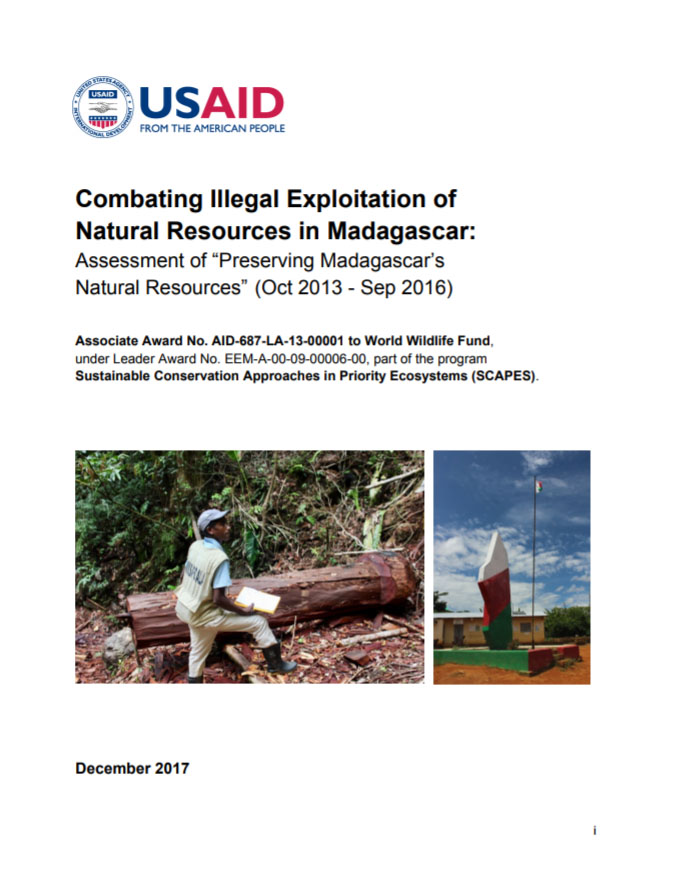Speeches Shim
The “Preserving Madagascar’s Natural Resources Program” (henceforth “the program” or, as it was known among partner and mission staff for its global program affiliation, “SCAPES”), implemented by a consortium led by World Wildlife Fund (WWF) and comprised of WWF, Wildlife Conservation Society (WCS), Conservation International (CI), and TRAFFIC, was a three-year program (October 2013 – September 2016). It sought to counter illegal and illicit natural resource extraction activities in the Atsinanana North ecoregion of Madagascar, with work focused in three landscapes: Marojejy-Tsaratanana-Anjanaharibe Corridor (COMATSA) led by WWF), Makira-Masaola-Antongil Bay (MaMaBay) led by WCS, and Ankeniheny-Zahamena Corridor (CAZ) led by CI. The overall objective of this US$2.25 million activity was to enhance the capabilities of the Malagasy people and civil society organizations to combat the illegal exploitation of Madagascar’s natural resources.
Each of the four partners led a line of effort contributing to a different intermediate result (IR), while working together to generate products and relationships useful across the program. Landscape leads facilitated and implemented actions associated with all IRs. The four IRs were:
IR-1: Improve understanding of unsustainable and illegal behavior associated with biodiversity loss and ecosystem degradation Lead: TRAFFIC. IR-1 activities included field work in timber and reptile sourcing regions and primary exit points, to strengthen Madagascar’s national knowledge-base on timber and reptile harvest and trade.
IR-2: Strengthen capacity of community-based organizations to monitor illegal activities involving Madagascar’s endangered natural resources and compliance with laws. Lead: WCS IR-2 focused on expanding the operationalization and implementation of the Law Enforcement and Threats Monitoring / Spatial Monitoring and Reporting Tool (SMART) system for participatory community patrols and National Park staff.
IR-3: Increase proactive and results-oriented engagement of civil society organizations in combating illegal practices targeting Madagascar’s endangered natural resources Lead: WWF IR-3 focused on strengthening the capacity of Civil Society Organizations (CSOs) representing the three landscapes, and linking these to broader regional and national environmental advocacy platforms.
IR-4: Improve media coverage and exposure of abusive practices targeting Madagascar’s endangered natural resources Lead: CI. IR-4 focused on empowering journalists to organize forums, conduct investigative projects and increase domestic media coverage of illegal activities in national newspapers, radio and TV programs.
Overall conclusions and recommendations:
- Support for bringing SMART to Madagascar has opened the door to improved wildlife law enforcement and ecological monitoring in the country. NGOs that were not part of the program are adopting the system more and more, and most importantly, the government is adopting SMART+ throughout the country. As the system enables data collection and transparency of aggregated information, it will serve as an important component of improved environmental governance for multiple actors.
- Journalists that participated in program training have courageously engaged in investigations of illicit activities. Some have suffered reprisals for their actions, including assault, theft, and imprisonment. One outcome of the training, however, was an informal journalist network that developed a strategy to spread the risk of publishing reports that could make them a target. When a story was ready, the journalists worked together to publish it simultaneously so that no one individual could be targeted for repercussions. This practice is now spreading to other media coverage of other sectors.
- Important enabling conditions helped the program succeed, but more is needed for the future. NGO partners’ long term investment in the three landscapes had already developed the relationships and some institutional structures essential to project success, however food security and alternative livelihoods are needed to address the underlying drivers of biodiversity loss and maintain constituencies for conservation.
- Bushmeat hunting and trade is a threat that needs greater attention in Madagascar, particularly for lemurs and tortoises. WCS reports of lemur hunting in the MAMABAY landscape as well as recent reports from the IUCN Tortoise & Freshwater Turtle Species Survival Group are alarming in terms of the scale of offtake. Bushmeat is often hunted not just for food but for income, and additional investments in food security and alternative livelihoods in these areas will be needed.
- Community patrols are operating well, but authorities are not responding quickly, or at all, to requests for assistance. Community motivation is suffering as a result. Community policing requires respect and trust on both sides in order to succeed.
- The local-to-national approach to civil society engagement seems to have generated the results intended. Continued support in the long- to medium-term is needed to ensure that CSO momentum continues, and that regional CSOs can continue supporting local CSOs while coordinating with national-level CSOs, including Coalition Nationale de Plaidoyer Environnemental (CNPE), a national environmental advocacy coalition.
- CNPE has promise but will need continued support and also some pressure to become self-sustaining. They have a well thought-out strategy for the next several years and are taking on some key environmental challenges including rosewood overexploitation, shifting agriculture, mining, mangrove health and turtle trafficking.
The program applied an integrated suite of activities that has strengthened natural resource governance, including Madagascar’s response to environmental crime. The local-to-national approach supported communities in managing their natural resources, bolstered effective law enforcement and prosecution, provided support systems for regional and national biodiversity conservation, and increased the information available for effective management and decisionmaking. Collectively, forests are better protected from illegal logging and the enabling environment for conserving overexploited reptiles and other wildlife is improved
Continued application and development of the tools, practices and policies fostered by the program will help Madagascar achieve its international conservation commitments while securing the natural resource base on which national development objectives depend.


Comment
Make a general inquiry or suggest an improvement.